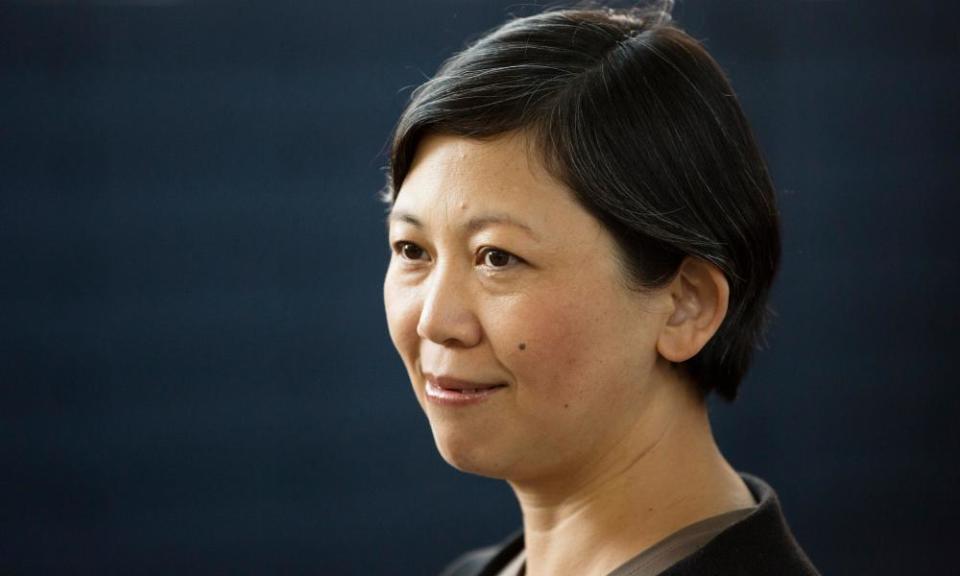Must I Go by Yiyun Li review – a haunting tale of a woman's becoming

Yiyun Li grew up near Beijing and emigrated to the United States in 1996 to work as an immunologist. She started attending writers’ workshops on the side and within a decade had won the Frank O’Connor award for her book of short stories. This was closely followed by a novel, The Vagrants, and a MacArthur “genius” grant: the reward, if ever there was one, for a singular talent.
But Li had always struggled with such western ideas of individuality. “I am not an autobiographical writer,” she later wrote, because “one can’t be without a solid and explicable self. What kind of life,” she wondered, “permits a person the right to become his own subject?” An American one, very possibly, for the idea that the forming of a singular self is a central subject for literature is one most western writers take for granted.
The Vagrants, for all the uncanny perfection of its English prose, reflected a more Chinese sensibility in its storytelling. Rather than follow a western Pilgrim’s Progress-style narrative of individual becoming, the novel dissects the fictional creation of a personality: in this case the making of a political martyr in the time of Tiananmen. As in the classic Chinese novel Dream of the Red Chamber, the tale is told in multiple, intersecting narratives, touched by folklore and history. Characters are both symbolic and real, at once parts of each other and part of a wider portrait of family, country and fate, their individuality gleaming briefly, lyrically and often tragically as they tumble past us in a tsunami of plot.
Li was finishing her second novel, Kinder than Solitude, when she suffered her own tragedies. It was followed by a bout of suicidal depression brought about by overwork and the pressures of writing in another language, as she recounted in her next book, the remarkable collection of essays, Dear Friend, from My Life I Write to You in Your Life. Maybe, she hazarded, it was not just her linguistic difficulty in using the “melodramatic” English “I” – a rarely used pronoun in Mandarin – that led her away from writing, in fiction or nonfiction, as an “I”, but it was also the wish to avoid her mother’s scrutiny. “Writing is the only part of my life that I have taken beyond my mother’s storytelling,” she wrote. “I have avoided writing in an autobiographical voice because I cannot bear that it could be overwritten by my mother’s omniscience.”
Li demonstrates in this haunting novel that there is more than one way to tell the story of a person’s becoming
Li then turned to this new novel, Must I Go, which is resolutely different. Not only is it set in California in the suburban landscapes and postwar decades familiar to us from Anne Tyler, but it takes as its central subject an all-American scrutinising mother with a spectacularly strong sense of self. Lilia (it is hard not to read that name as a mirror-rendering of Yiyun Li, especially when her second name is “Imbody”) is 85, thrice widowed and, after a lifetime of telling everyone else who they are and what they want, is now intent on defining her own legacy for her granddaughter and great-granddaughter. She despises the “memoir class” in her sheltered living centre, though. Instead, she decides to annotate the recently published diary of one Roland Bouley, dilettante, aspiring novelist, and father (unbeknown to him) of Lilia’s daughter Lucy.
According to Li, she was just arriving at the point in the novel which reveals that Lucy killed herself in the year that Lilia was 44 when her own 16-year-old son took his life. In “an uncanny coincidence”, Li was also 44. She stopped writing the novel, and produced instead the devastating Where Reasons End: a series of dialogues with her dead son that are original, funny and intensely sad. It is surprising, perhaps, that she returned to Must I Go, but go back she did, picking up the story, moreover, at the point where the third-person narrator gives way to Lilia’s annotations of Roland’s diary – at the place where the “she” is replaced with two of those dreaded, obdurate “I”s.
Of the two voices, Roland’s is the less compelling and convincing. He is cold, acquisitive and, by his own account, intellectual and literary; to match this, his diaries needed to be a feat of voice, to sound like The Portrait of a Lady’s Gilbert Osmond, looter of words as well of artworks and people; or perhaps, as he immerses himself in wartime Britain, to take on the orotund tones of the political diarist Alan Clark. But Bouley writes in the same 21st-century style as the rest of the book: no speech marks, few semicolons, short sentences and contemporary vocabulary choices. “Those days when Malcolm and I lay in the meadow … the birds sang more freely, the shafts of sunlight were more vibrant, our hearts more full of sweet yearning … I now feel bad that I neglected to keep in touch with him.”

The style is so limpid it could almost be translation, and in fact the more we read of this American/European hero, the more Chinese he begins to seem. Like Jia Baoyu, hero of Dream of the Red Chamber, he is much in thrall to his family, suffering as a result an arranged marriage to his wholesome cousin, Hetty, while remaining romantically attached to an older woman and fetishising a withdrawn opportunity to attend Oxford. In wartime London, he becomes a propagandist with a Maoist feel for aphorism: “I have a serviceable skill for writing public relations slogans … I am as indispensable as a barber, who will never be out of business unless the war wipes out the entire [sic] mankind.”
All this Lilia ferociously critiques and edits, inserting her own story as she does so. She grew up on a ranch so all-American it sells themed holidays; her hair is red, and her whole reason for writing is self-determination. Nevertheless, the more she writes, the more multiple, the more mired in family, and the more Chinese her narrative also becomes. The spring of a western-style plot, that Lucy is Roland’s daughter, is told to us almost at once. The romantic heart of the novel – who does Lilia truly love? – is also brushed past or told by inference.
Family members (Lilia’s younger sisters, her ambitious daughter Molly) have a way of abruptly emerging from the shadows bearing their complete and fascinating life stories then exiting again without comment. Other characters (two of Lilia’s husbands, for example) remain barely developed. There are sudden irruptions of historical drama, such as the death of a child in a San Francisco earthquake. Lilia turns more and more frequently from the narrative to deliver aphorisms and fables: “The world would be a better place if we were lined up like dominos in front of a giant turtle … I want all my children and grandchildren and great grandchildren alive when it’s time for me to go,” she says, imagining herself bargaining with the turtle very much in the style of a Ming dynasty storyteller.
Lilia’s stories, though, as the one above shows, are salty, funny, well observed, and have an ironic, tragic edge. As she arranges them into a dense, crowded Chinese tapestry of characters, personal myths and history, her humanity and largeness of mind are also revealed. And as all those bleak edges and ironic gaps are laid together, so a pulled thread of grief is revealed in the weave: the unsolvable mystery of why Lucy died. Li demonstrates in this haunting novel that there is more than one way to tell the story of a person’s becoming, and that multiple narratives can work just as well as singular ones to help us understand the nature of grief.
• Kate Clanchy’s Some Kids I Taught and What They Taught Me won the 2020 Orwell prize. Must I Go by Yiyun Li is published by Hamish Hamilton (£16.99). To order a copy go to guardianbookshop.com. Delivery charges may apply.


